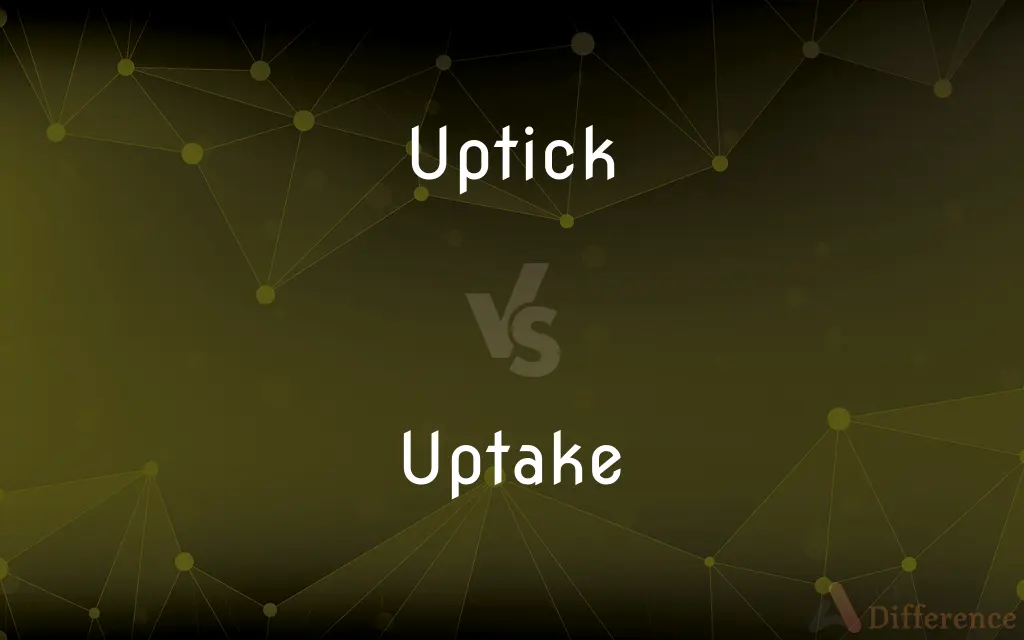Uptick vs. Uptake — What's the Difference?
Edited by Tayyaba Rehman — By Fiza Rafique — Updated on March 26, 2024
An uptick is a small increase, often in financial contexts, whereas uptake refers to the absorption or understanding of something.

Difference Between Uptick and Uptake
Table of Contents
ADVERTISEMENT
Key Differences
An uptick typically denotes a slight rise or improvement, particularly in financial markets, indicating a minor increase in stock prices or market indices. Uptake, on the other hand, concerns the process of absorbing or taking in substances, ideas, or information, emphasizing the act of understanding or assimilation rather than physical absorption in non-biological contexts.
In the context of finance, an uptick can signal positive market sentiment or a favorable reaction to news, suggesting a potential trend or reversal in stock or commodity prices. Conversely, uptake is more often used in educational or psychological contexts, referring to how individuals or groups understand or accept new information or ideas, reflecting on the capacity to learn or adapt.
While uptick is quantifiable and often visible through numerical data or charts, making it a term favored in economic reports and analyses, uptake is qualitative, focusing on the efficiency or rate at which a process occurs, whether it's the absorption of nutrients by plants or the adoption of new technologies by society.
The significance of an uptick in financial markets can have broad implications, affecting investment decisions, market forecasts, and economic outlooks. Uptake, however, is critical in fields such as education, healthcare, and environmental science, where it influences teaching methods, patient care strategies, and ecological conservation efforts, respectively.
The terms thus serve distinct functions in different fields: an uptick marks a moment of financial improvement or recovery, serving as an indicator for analysts and investors, while uptake highlights processes of absorption and understanding, key to educators, psychologists, and scientists. Understanding the nuances between them helps clarify discussions across various disciplines, ensuring precise communication.
ADVERTISEMENT
Comparison Chart
Definition
A slight increase or improvement, often used in financial contexts.
The absorption or understanding of something, used in various contexts including biology, psychology, and education.
Contexts of Use
Financial markets, economics.
Education, healthcare, environmental science, biology.
Nature
Quantifiable, often represented by data or charts.
Qualitative, focusing on the efficiency or rate of absorption or understanding.
Implications
Indicates market trends, investor sentiment.
Relates to learning efficiency, health treatment absorption, environmental processes.
Measurement
Numerically, through price changes or market indices.
Through assessments of learning, health outcomes, or biological absorption rates.
Compare with Definitions
Uptick
A small increase or slight upward trend, especially in financial contexts.
The stock market showed an uptick in prices after the positive earnings report.
Uptake
The act of understanding or grasping concepts, information, or ideas.
His quick uptake of complex theories impressed his professors.
Uptick
A small but noticeable increase in performance or activity.
The new policy led to an uptick in renewable energy production.
Uptake
The absorption rate or efficiency of a process.
Studies show the uptake of this medication varies among individuals.
Uptick
A minor improvement or rise in a particular metric or activity.
There was an uptick in consumer confidence this quarter.
Uptake
The degree to which something is absorbed or adopted, such as innovation.
The uptake of new technology in the classroom enhanced learning experiences.
Uptick
A slight recovery or advance in value or quantity.
The uptick in home sales indicates a recovering real estate market.
Uptake
The action or process of taking up or making use of something available.
The program's success depended on the uptake of health services by the community.
Uptick
A marginal rise in statistics or indicators.
The uptick in employment rates suggests an improving economy.
Uptake
The process of absorbing or taking in substances, as by a living organism.
Plant uptake of nutrients is essential for growth and development.
Uptick
An increase, especially a small or incremental one
Last week's uptick in interest rates.
Uptake
A passage for drawing up smoke or air.
Uptick
A transaction in a stock market executed at a price above the previous transaction for the same security.
Uptake
Understanding; comprehension
Very quick on the uptake.
Uptick
A small increase or upward change in something that has been steady or declining.
Uptake
An act of taking in or absorbing, especially into a living organism.
Uptick
(finance) A stock market transaction or quote at a price above a preceding one.
Uptake
Understanding; comprehension.
Uptick
A transaction in the stock market at a price above the price of the preceding transaction
Uptake
Absorption, especially of food or nutrient by an organism.
Uptake
The act of lifting or taking up.
Uptake
(dated) A chimney.
Uptake
(dated) The upcast pipe from the smokebox of a steam boiler towards the chimney.
Uptake
(archaic) To take up, to lift.
Uptake
To absorb, as food or a drug by an organism.
Uptake
To accept and begin to use, as a new practice.
Uptake
To take into the hand; to take up; to help.
Uptake
The pipe leading upward from the smoke box of a steam boiler to the chimney, or smokestack; a flue leading upward.
Uptake
Understanding; apprehension.
Uptake
The process of taking food into the body through the mouth (as by eating)
Uptake
A process of taking up or using up or consuming;
They developed paper napkins with greater uptake of liquids
Common Curiosities
Can uptake refer to the absorption of ideas?
Yes, uptake can refer to how quickly and effectively a person or group understands or adopts new ideas.
Is an uptick always a positive sign in markets?
Generally, yes, as it indicates a slight improvement or recovery, but context is essential for interpretation.
How is an uptick measured?
An uptick is measured numerically, often seen in the context of price changes or improvements in statistical data.
Does an uptick in consumer confidence impact the economy?
Yes, it can lead to increased spending and investment, stimulating economic growth.
What is an uptick in finance?
An uptick in finance refers to a slight increase in stock prices or market indices.
How does the uptake of health services affect public health?
High uptake can lead to better health outcomes and reduced disease spread.
What factors influence nutrient uptake in plants?
Factors include soil composition, water availability, and plant health.
How can educators enhance the uptake of new information by students?
Through interactive teaching methods, practical applications, and ensuring content relevance.
Can the uptake of a medication differ among individuals?
Yes, due to factors like metabolism, health conditions, and other medications.
What is the significance of an uptick in renewable energy production?
It signifies progress towards sustainability and reduced reliance on fossil fuels.
How is the uptake of new technologies measured in a community?
Through adoption rates, surveys, and analyzing changes in habits or efficiencies.
Why is understanding nutrient uptake important in agriculture?
To optimize crop yields and ensure efficient use of fertilizers.
What does an uptick in employment rates indicate?
It suggests an improving labor market and potentially, economic growth.
What role does uptake play in environmental conservation?
Understanding processes like carbon uptake by forests is crucial for managing climate change impacts.
Can a financial uptick influence investor behavior?
Yes, it can boost investor confidence and lead to increased market activity.
Share Your Discovery

Previous Comparison
Flapper vs. Slapper
Next Comparison
Afebrile vs. ApyrexiaAuthor Spotlight
Written by
Fiza RafiqueFiza Rafique is a skilled content writer at AskDifference.com, where she meticulously refines and enhances written pieces. Drawing from her vast editorial expertise, Fiza ensures clarity, accuracy, and precision in every article. Passionate about language, she continually seeks to elevate the quality of content for readers worldwide.
Edited by
Tayyaba RehmanTayyaba Rehman is a distinguished writer, currently serving as a primary contributor to askdifference.com. As a researcher in semantics and etymology, Tayyaba's passion for the complexity of languages and their distinctions has found a perfect home on the platform. Tayyaba delves into the intricacies of language, distinguishing between commonly confused words and phrases, thereby providing clarity for readers worldwide.














































